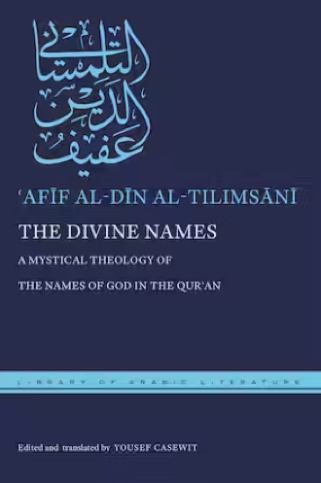The Divine Names
Breve descripción (SPA)
The Divine Names es un comentario filosóficamente sofisticado sobre los nombres de Dios. Escrito por el erudito norteafricano y poeta sufí de los siglos VII y XIII ʿAfīf al-Dīn al-Tilimsānī, Los Nombres Divinos expone los ciento cuarenta y seis nombres de Dios que aparecen en el Corán, incluido El Todomisericordioso, Los poderosos, los primeros y los últimos. En su tratamiento de cada nombre divino, al-Tilimsānī sintetiza y compara las opiniones de tres influyentes autores anteriores, al-Bayhaqī, al-Ghazālī e Ibn Barrajān.
Breve descrição (POR)
Os Nomes Divinos é um comentário filosoficamente sofisticado sobre os nomes de Deus. Escrito por el erudito norteafricano y poeta sufí de los siglos VII y XIII ʿAfīf al-Dīn al-Tilimsānī, Los Nombres Divinos expone los ciento cuarenta y seis nombres de Dios que aparecen en el Corán, incluido El Todomisericordioso, Los poderosos, los primeros y os últimos. Ao tratar cada nome divino, al-Tilimsānī sintetiza e compara as opiniões de três autores influentes anteriores, al-Bayhaqī, al-Ghazālī e Ibn Barrajān.
Full description (ENG)
A Sufi scholar’s philosophical interpretation of the names of God
The Divine Names is a philosophically sophisticated commentary on the names of God. Penned by the seventh-/thirteenth-century North African scholar and Sufi poet ʿAfīf al-Dīn al-Tilimsānī, The Divine Names expounds upon the one hundred and forty-six names of God that appear in the Qurʾan, including The All-Merciful, The Powerful, The First, and The Last. In his treatment of each divine name, al-Tilimsānī synthesizes and compares the views of three influential earlier authors, al-Bayhaqī, al-Ghazālī, and Ibn Barrajān.
Al-Tilimsānī famously described his two teachers Ibn al-ʿArabī and al-Qūnawī as a “philosophizing mystic” and a “mysticizing philosopher,” respectively. Picking up their mantle, al-Tilimsānī merges mysticism and philosophy, combining the tenets of Akbari Sufism with the technical language of Aristotelian, Neoplatonic, and Avicennan philosophy as he explains his logic in a rigorous and concise way. Unlike Ibn al-ʿArabī, his overarching concern is not to examine the names as correspondences between God and creation, but to demonstrate how the names overlap at every level of cosmic existence. The Divine Names shows how a broad range of competing theological and philosophical interpretations can all contain elements of the truth.
Arts & Humanities
otras áreas de / interés...
other areas of / interest...
outras áreas de interesse...
¿Buscas un título en un área específica?
Looking for books in a specific area?
¿Procurando livros em uma área específica?














